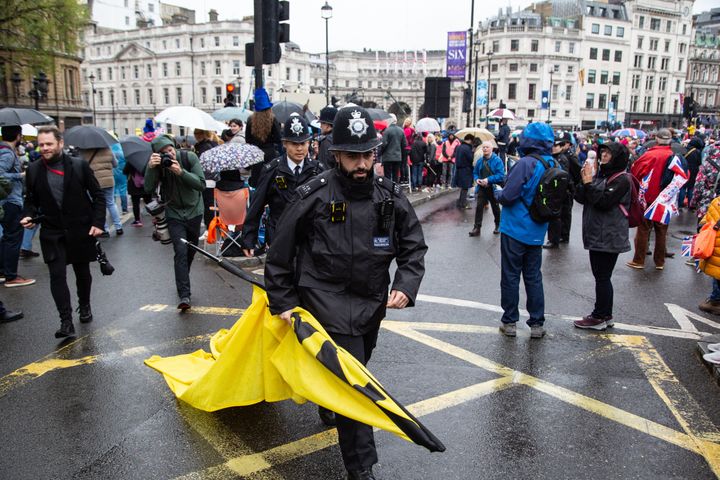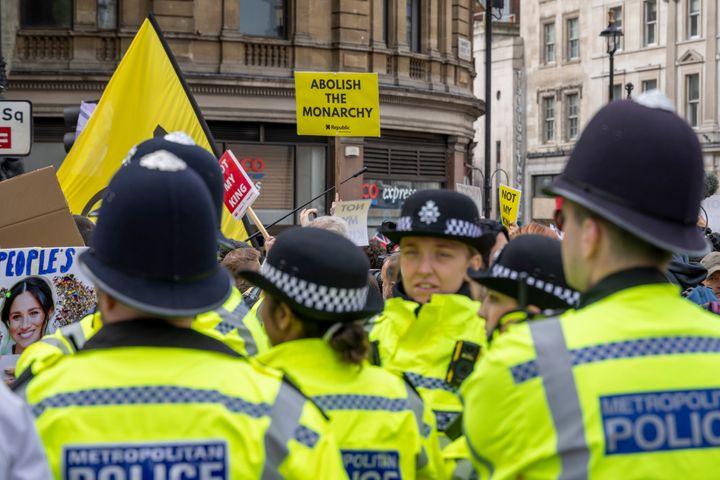Furious republicans have told the police to “hang their heads in shame” after protesters were arrested at King Charles’ coronation.
Graham Smith, CEO of anti-monarchy group Republic, said the right to protest peacefully in the UK “no longer exists”.
Advertisement
He blasted the Met Police for showing “no judgement, no common sense and no basic decency” after scores of demonstrators were arrested on Saturday.
Smith described it as a “direct attack on our democracy and the fundamental rights of every person in the country”.
He was arrested among 52 people during the king’s coronation on Saturday before being released after nearly 16 hours in police custody.
Advertisement
The Metropolitan Police Service has faced criticism after more than 50 people were arrested for alleged affray, public nuisance and breach-of-the-peace offences.
The arrests were described by human rights organisations as a “dangerous precedent” for a democratic nation.
In a statement following his release, Smith said: “Yesterday, as we prepared for a peaceful and lawful protest, a number of Republic’s team were arrested and detained for the rest of the day.
“These arrests are a direct attack on our democracy and the fundamental rights of every person in the country.

SOPA Images via Getty Images
Advertisement
“Each and every police officer involved on the ground should hang their heads in shame. They showed no judgement, no common sense and no basic decency.
“This was a heavy handed action which had the appearance of a pre-determined arrest that would have occurred regardless of the evidence or our actions.
“The right to protest peacefully in the UK no longer exists. Instead we have a freedom to protest that is contingent on political decisions made by ministers and senior police officers.”
Smith said the arrests had “destroyed” whatever trust might have existed between peaceful protesters and the Met Police.
He questioned what was the point in the protesters being “open and candid with the police, working with their liaison officers and meeting senior commanders” if this is what happens.
Advertisement

SOPA Images via Getty Images
The campaigner insisted they would not be deterred from further protest, adding: “We will continue to protest with one simple message: Charles is not our king, it is time to abolish the monarchy.”
However, culture secretary Lucy Frazer insisted the police got the “balance right” and denied that officers had gone too far.
She told Sky News’ Sophy Ridge: “I think, overall, they managed to get that balance right.”
Home secretary Suella Braverman also praised the police for their actions, tweeting: “I’m incredibly grateful to the police for all their hard work at today’s coronation celebration to ensure it was safe and passed without incident.”
Met Police commander Karen Findlay acknowledged concerns about the arrest of protesters but defended Scotland Yard’s actions, saying: “Our duty is to do so in a proportionate manner”.
Advertisement

Andrew Aitchison via Getty Images
She said: “We absolutely understand public concern following the arrests we made [on Saturday morning].
“Protest is lawful and it can be disruptive. We have policed numerous protests without intervention in the build-up to the coronation, and during it.
“Our duty is to do so in a proportionate manner in line with relevant legislation. We also have a duty to intervene when protest becomes criminal and may cause serious disruption.
“This depends on the context. The coronation is a once in a generation event and that is a key consideration in our assessment.
Advertisement
“A protest involving large numbers has gone ahead today with police knowledge and no intervention.”
The Met said it received information that protesters were “determined to disrupt” the coronation – including defacing public monuments with paint, breaching barriers and disrupting official movements.
They confirmed 52 people were arrested for affray, public order offences, breach of the peace and conspiracy to cause a public nuisance around the coronation.
Under the controversial new Public Order Act, protesters who have an object with the intention of using it to “lock on” are liable to a fine, with those who block roads facing 12 months in prison.



 (@GrahamSmith_)
(@GrahamSmith_) 




